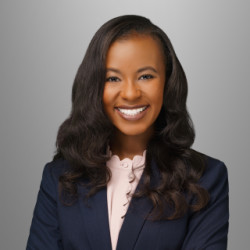When I walked into the cath lab and introduced myself to the staff, I told myself that I felt discomfort because I was “just a resident” and would just likely be in the way. Truly, however, it was because I felt that, as a woman of color, I didn’t belong. In the U.S., 13% of practicing cardiologists and 4.5% of interventional cardiologists are women. Overall, less than 3% are Black women.
I found the third-year cardiology fellow and introduced myself as the second-year resident on my cardiology elective assigned to the cath lab that day. He asked me what my goals after residency were. I hesitated, thinking about the speech most people gave me whenever I would divulge that I wanted to be an interventional cardiologist. I contemplated whether I wanted to receive unsolicited advice at 7 a.m. on the demands of interventional cardiology for women — the long hours, back pain from wearing heavy lead, and being on STEMI call, all while balancing family life. As I peeked over his shoulder at the angiogram behind him, I blurted out, “interventional cardiology.”
“Oh, me too!” he said. “I’m actually coming here next year for interventional. OK, come with me to pre-op. We’ll see the patients together.”
The way he accepted my response and immediately included me in patient care was unexpected. I felt accepted. No unsolicited advice, just excitement to teach me. He’d drop little gems of advice as we rounded. “Have you worked with doctor so and so? Let me give you his number, he’d be happy to chat with you about a few cardiology programs for when you apply next year. Have you met some of our female fellows? Oh, Raven is actually on consults tomorrow. Here’s her number, shoot her a text tonight.”
I admit, I felt my eyes fill up a bit. It’s difficult to put into words what this interaction meant to me as a woman in medicine chasing a specialty that is historically male dominated. I struggle with impostor syndrome despite my above average USMLE scores because of the statistics I mentioned, but that day, the voice telling me that I didn’t belong began to fade into the background.
I was saving all the new contacts in my phone as we made it back to the cath lab, when I heard someone say, “Njeri, find some lead that fits you.”
I looked up to see the attending gesturing to the wall of lead aprons.
Oh my gawd. He’s talking to me.
I had been eyeballing a very chic zebra-print lead that hung the shortest on the rack. I wrapped it around my body, connected the matching thyroid protector around my neck and took a step. It was heavy, but it protected all those vital organs everyone warned me would “get in the way” of pursuing interventional cardiology as a woman. I found a spot where I could see the patient and the screen. The attending walked over to me and began pointing at the screen as the fellow guided the wire up into the vessels and shot dye into the coronaries. He pointed, asked me questions, taught me, and only took a break to stand next to the fellow when the stent was deployed.
After the case, I walked over to thank the attending for the time he spent walking me through what was happening. Before I could thank him, the fellow blurted out, “Hey, did Njeri tell you she wants to do interventional?”
The attending said, “I know, we’ve worked together before,” then turned to me as he pointed to the screen behind me. “Njeri, let’s review the anatomy, I want to show you where we placed the stent. Also, her pulmonary hypertension is quite fascinating, so we’ll talk a bit about the pressures in the chambers as well.”
In the 10 seconds between the fellow blurting out my interest and my attending teaching me, I recognized that they, both men, did not at any point give me unsolicited advice about life as a woman wanting to pursue interventional cardiology. Instead, they both treated me as their equal. The impostor syndrome I had been battling most of the morning dissipated.
In cardiology, there is a term that is frequently used to describe this occurrence, where male colleagues are allies for female trainees: “HeForShe.” It was initially coined by the U.N. and symbolizes an effort toward gender equality, in hopes of catapulting more female trainees into cardiology by giving career advice, increasing networking opportunities, and facilitating sponsorship introductions. All of these facets encompass one word: mentorship.
As I progressed in residency, my attending became a strong clinical mentor and offered to write me a letter of recommendation for fellowship, and my fellow introduced me to multiple well-connected people throughout the application season. When the general cardiology Match results were announced this year, I was excited to share with them that I had matched at one of my top programs.
As we move forward in our careers, I urge all of us to reflect on those who aided in our success. A conversation followed by intentional action can impact the trajectory of our junior trainees.
“If I have seen further it is by standing on the shoulders of Giants.” -Sir Isaac Newton
What has been the impact of mentorship on your choice of medical specialty? Share your experiences in the comment section.
Dr. Kuria is an internal medicine resident physician in Loma Linda, CA who’s passionate about preventing heart disease. She enjoys museums, traveling, and trying new vegetarian recipes. She tweets at @kuriascase. Dr. Kuria is a 2022-2023 Doximity Op-Med Fellow.
Image by Alphavector / Shutterstock







